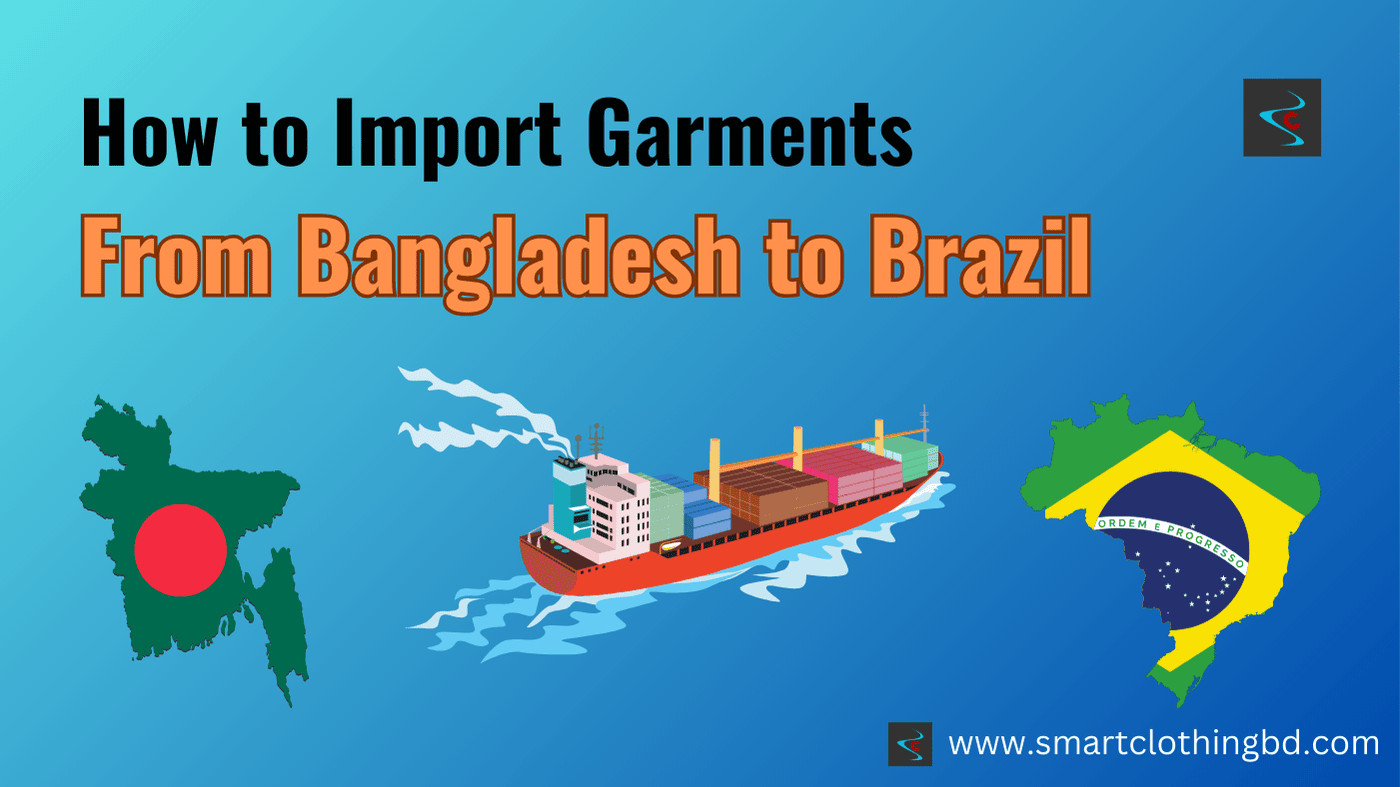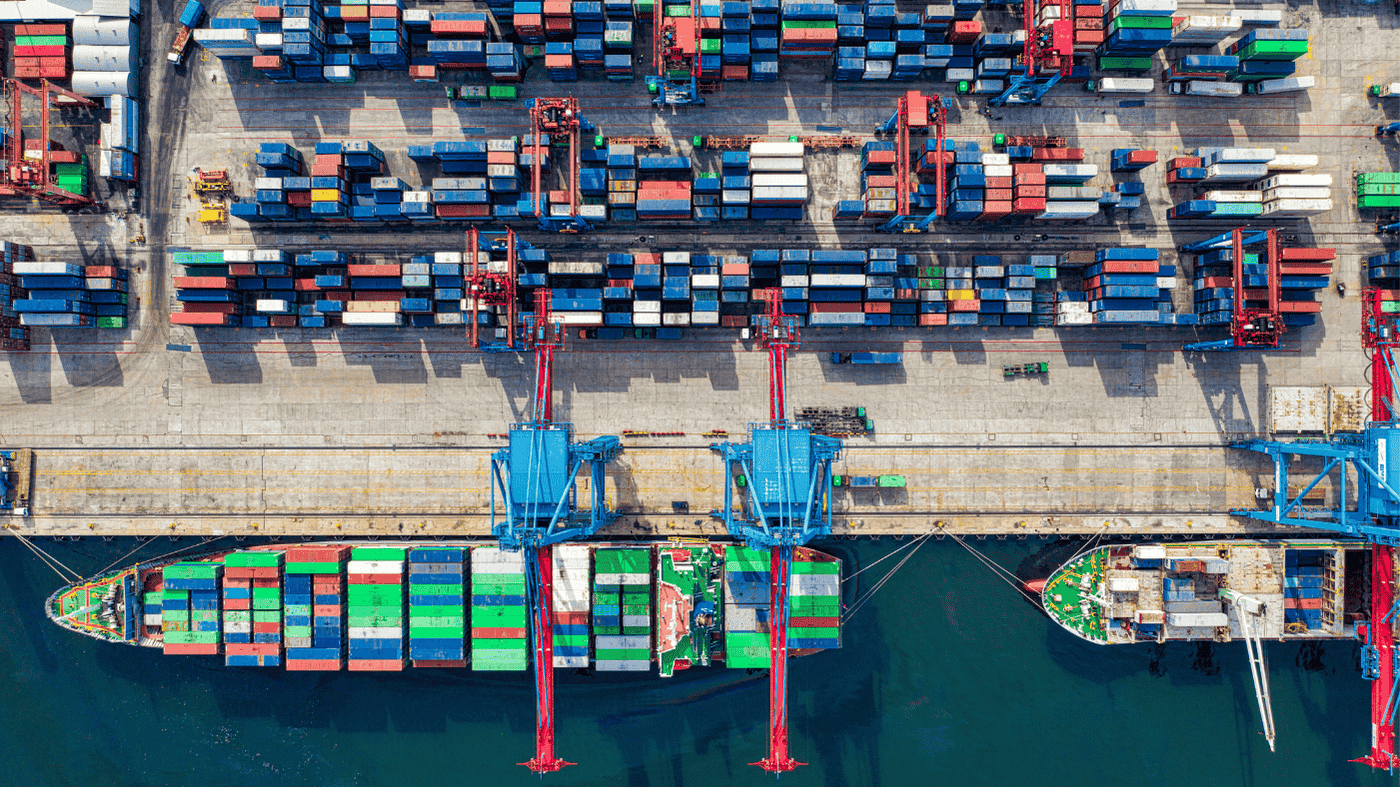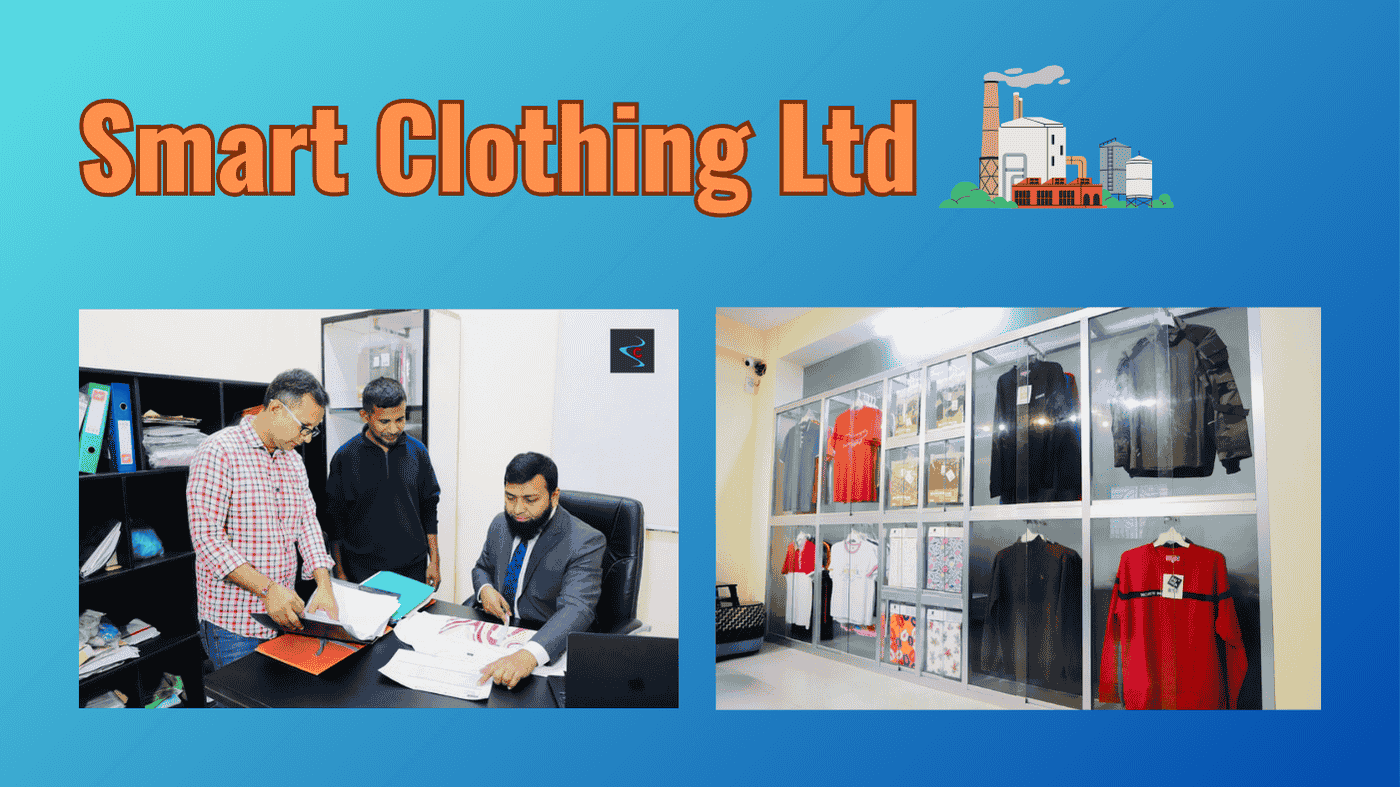
The global apparel trade has undergone remarkable transformations over the years, and one country stands out as a powerhouse in garment manufacturing—Bangladesh. For Brazilian importers, retailers, and small business owners, sourcing garments from Bangladesh presents a massive opportunity to access high-quality, cost-efficient products while tapping into the world’s second-largest apparel exporter.
This guide will provide an in-depth look at- How to import garments from Bangladesh to Brazil, the steps involved, and how to overcome common challenges. Whether you’re looking to bring sustainable fashion into your store, stock bestselling items like polos or trousers, or forge long-term relationships with Bangladesh’s expert garment manufacturers, we’ve got you covered.
Why Choose Bangladesh for Garment Imports?
1. Competitive Advantages
Bangladesh clothing manufacturers dominate the global apparel scene thanks to their state-of-the-art facilities, skilled labor, and cost-efficient operations. Whether you’re sourcing high-quality private-label clothing or seeking manufacturers who cater to small businesses, the Bangladeshi garment industry offers something for everyone.
Advantages include:
- High-Quality Standards: Constant upgrades to manufacturing technology ensure exceptional output for clothing orders worldwide.
- Cost-Effective Production: Skilled yet affordable labor makes Bangladesh a competitive destination compared to other overseas garment manufacturers.
- Large-Scale Capacity: Home to some of the largest garment manufacturing companies globally, Bangladesh meets the high demands of international buyers with ease.
Whether you’re dealing with small orders or large-scale productions, you’ll find the right partner among the many clothing manufacturers for small businesses and enterprises alike.
2. Popular Products from Bangladesh
Bangladesh produces a wide range of apparel ideal for global markets, including items Brazilian importers can source like:
Knitwear
Bangladesh is a top producer of knitwear, including t-shirts, polos, and innerwear known for quality, comfort, and affordability. With advanced machinery and skilled labor, the industry delivers durable garments that meet international standards.
Woven
Woven garments, such as shirts, trousers, denim, and jackets, are highly valued by global brands for their craftsmanship. Modern production facilities ensure a variety of designs, patterns, and finishes to suit buyers’ needs.
Sweaters
Sweater production is a Bangladeshi specialty, offering styles and designs for all seasons. Using advanced knitting technologies, manufacturers produce lightweight and heavy-knit options while maintaining high quality and meeting bulk order demands.
Sustainability is a growing focus, with many factories adopting eco-friendly practices. Whether you’re importing T-shirts or sustainable fashion, Bangladesh offers options to meet your needs and impress customers.
3. Bangladesh’s Apparel Export Reputation
When it comes to global rankings, Bangladesh’s performance rivals giants like China. Known as the second-largest apparel exporter globally, it accounts for a significant share of the global clothing industry. The country’s ready-made garment (RMG) sector is a cornerstone of its economy, employing millions and contributing significantly to national GDP. Notable partnerships with major international brands such as H&M, Zara, and Gap illustrate Bangladesh’s ability to meet stringent buyer requirements in terms of quality, quantity, and timely delivery. Additionally, the country has made strides in adopting sustainable practices, with many factories now holding certifications for environmentally friendly and ethical production. Through innovation and resilience, Bangladesh continues to solidify its position as a leader in the global apparel market.
Understanding the Brazilian Import Regulations
When importing garments from Bangladesh to Brazil, it’s essential to familiarize yourself with the country’s import regulations. These rules impact everything from taxation and customs clearance to trade agreements that could lower costs and improve efficiency. Below, we break down the key aspects you need to know for a smooth import process.
1. Import Policies and Trade Agreements
Trade agreements play a significant role in reducing the barriers to international trade, and one such agreement is the Mercosur-Bangladesh Preferential Trade Agreement (PTA). Mercosur—an economic bloc made up of Brazil, Argentina, Uruguay, and Paraguay—has partnered with Bangladesh under this agreement to strengthen trade relations.
This PTA is a game-changer for those importing garments from Bangladesh into Brazil. It facilitates a reduction in tariffs, which can lead to significant cost savings on your imports. Additionally, the agreement simplifies trade procedures and aims to foster a smoother flow of goods between the two countries. For businesses, this means faster delivery times, improved competitiveness in the Brazilian market, and the chance to maximize profit margins. By leveraging the benefits of the PTA, importers can optimize sourcing strategies and offer more competitively priced products to Brazilian consumers.
2. Taxation and Tariffs
When importing apparel into Brazil, several taxes and tariffs must be accounted for, significantly impacting overall costs. These include:
- Import Duty: This is applied to the customs value of the imported goods, which includes the cost of the product, freight, and insurance.
- ICMS (Value-Added Tax): A state-level tax that varies depending on the state where the goods are cleared but generally ranges from 17% to 19%.
- PIS and COFINS (Social Integration Program Taxes): These are federal taxes applied to the importation of goods, typically amounting to around 9.25% combined.
Understanding these taxes is critical when creating your sourcing and pricing strategies. For instance, while the PTA can reduce tariffs, other taxes, such as ICMS, PIS, and COFINS, will still apply. Thoroughly calculating these fees in advance ensures that you can accurately predict your profit margins and avoid unexpected expenses.
3. Required Documentation
To comply with Brazilian import regulations, you must have the proper documentation in place. Missing or incorrect documentation can lead to costly delays or even the rejection of your shipment. Key documents required include:
- Import License (RADAR/SISCOMEX): This license is mandatory for any business importing goods into Brazil. It grants access to the SISCOMEX system, which is used to register and monitor imports.
- Invoice and Packing List: These documents provide details about the goods being shipped, including their value, quantity, and weight.
- Certificate of Origin: This is particularly important for imports under trade agreements like the Mercosur-Bangladesh PTA. It verifies that the goods originate from Bangladesh and qualify for any tariff reductions outlined in the agreement.
Additionally, depending on the type of apparel being imported, there may be specific labeling requirements or product certifications to meet Brazilian standards. Ensuring all documentation is accurate and complete can help avoid unnecessary delays at customs and ensure a smooth entry for your goods.
In summary, understanding and navigating Brazil’s import regulations, including the tax structure, documentation requirements, and trade agreements, is essential for success. With the Mercosur-Bangladesh PTA, there is a unique opportunity to reduce costs and streamline operations, allowing Bangladeshi exporters and Brazilian importers to thrive in a competitive global market.
Steps to Import Garments from Bangladesh to Brazil

1. Identifying Reliable Suppliers
Begin by identifying trustworthy clothing suppliers in Bangladesh, as this forms the foundation of your import process. Use resources like:
- The Bangladesh Garment Manufacturers and Exporters Association (BGMEA), which provides a list of vetted and registered manufacturers.
- B2B platforms such as Alibaba or Made-in-China, where you can research and communicate directly with suppliers.
- A garment sourcing agency or local clothing sourcing agents who are familiar with the Bangladeshi market and can help you navigate supplier selection.
When selecting a garments supplier, thoroughly vet them to ensure they meet your quality standards, production capacity, and delivery timelines. Consider requesting samples, checking reviews, or even visiting the factory if possible. Building a reliable relationship with your supplier can prevent miscommunication and ensure a smooth process.
2. Negotiating Terms
Once you have identified potential suppliers, the next step is to negotiate terms. Establish clear and mutually agreeable terms regarding:
- Minimum Order Quantities (MOQs): Ensure you understand the supplier’s MOQ requirements and confirm that they align with your business needs.
- Payment Methods: Common options include Letters of Credit (LC) for secure transactions or Telegraphic Transfers (TT) for faster payments. Discuss any associated fees or payment schedules upfront.
- Lead Times and Production Schedules: Confirm how long production will take and discuss timelines in detail to avoid delays.
Having everything agreed upon and documented reduces potential misunderstandings during production and ensures both parties are aware of their responsibilities.
3. Shipping Options and Logistics
Shipping logistics play a critical role in importing garments. Most export shipments from Bangladesh rely on FOB (Free on Board) Chittagong Port, where the seller is responsible for delivering the goods to the port. Here are key points to consider:
- Transit Times: Shipping from Bangladesh to Brazil typically takes 20-30 days, depending on the shipping method and route. Air freight is faster but significantly more expensive than sea freight.
- Shipping Providers: Partner with reliable shipping providers or freight forwarders who have experience handling shipments between Bangladesh and Brazil. Their expertise can help you manage customs, reduce uncertainties, and ensure timely deliveries.
- Insurance and Tracking: Ensure your shipment is insured and that tracking information is provided to monitor the progress of your goods during transit.
Be proactive in communicating with your shipping provider to address any potential issues that may arise during transportation.
4. Customs Clearance in Brazil
Navigating customs in Brazil requires careful preparation and accurate documentation. To import garments from Bangladesh to Brazil, Ensure you have the following documents ready:
- Commercial Invoices: Detailed invoices that include product descriptions, quantities, and values.
- Packing Lists: A breakdown of how items are packed, including weights and dimensions.
- Freight Manifests: Documentation from your shipping provider that outlines the shipping details.
Partner with an experienced customs broker or freight forwarder who understands Brazil’s import regulations and can guide you through the process. Familiarize yourself with Brazil’s tax and duty requirements for textile products to ensure compliance. Errors or missing documents can lead to costly delays, so double-check everything before submitting.
By following these steps and paying attention to details, you can streamline the process of importing garments from Bangladesh to Brazil, ensuring a successful and efficient supply chain for your business.
Ensuring Quality and Compliance
1. Conducting Pre-Shipment Inspections
Before your shipment leaves Bangladesh to Brazil, it’s crucial to arrange for comprehensive third-party quality inspections. These inspections verify that your garments meet global quality standards and adhere to your specifications. By thoroughly checking for defects, mislabeling, or sizing issues, these evaluations help prevent costly financial losses, avoid customer dissatisfaction, and protect your brand’s reputation in competitive markets. Investing in pre-shipment inspections ensures that the products delivered to your customers reflect the high standards your brand promises.
2. Sustainable Sourcing Practices
In today’s market, sustainability and ethical production are more important than ever. To attract environmentally conscious consumers and align with global best practices, seek out manufacturers certified with standards like:
- OEKO-TEX: This certification guarantees that textiles are free from harmful substances and meet strict environmental and safety criteria.
- BSCI (Business Social Compliance Initiative): BSCI-certified manufacturers adhere to ethical business practices, ensuring fair wages, safe working conditions, and responsible resource management.
These certifications not only demonstrate a commitment to sustainable sourcing but also enhance your brand’s image as a socially and environmentally responsible business. By choosing certified manufacturers, you can ensure your products are eco-friendly, ethically produced, and appeal to a growing base of conscious consumers in the global market.
Building Long-Term Relationships with Suppliers
1. The Importance of Strong Partnerships
Strong connections with Bangladeshi apparel exporters pave the way for reliable deliveries and favorable terms on pricing or MOQs. Communicate regularly and provide feedback to cultivate these relationships over time.
2. Maintaining a Competitive Edge
Keep up with the latest trends in Bangladesh’s garment industry. Diversifying your offering with innovative designs or environmentally sustainable products is key to staying ahead of competitors in the Brazilian market.
Challenges and How to Overcome Them
1. Common Challenges
- Language Barriers: Communication issues can arise when negotiating terms, clarifying product specifications, or addressing quality concerns, making it difficult to ensure alignment between parties.
- Lead Times: Logistics delays, such as shipping bottlenecks, customs clearance, or production setbacks, can disrupt timelines and lead to missed deadlines, impacting supply chain efficiency.
2. Mitigation Strategies
- Partner with a reliable garment sourcing agency: A reputable agency can act as a bridge to navigate cultural differences and language barriers, ensuring smoother communication and minimizing misunderstandings.
- Establish detailed contracts: Clearly written contracts should outline every aspect of the agreement, including product quality, timelines, payment terms, and penalties for delays, providing both parties with clear expectations and protection against unexpected issues.
Why Choose Smart Clothing Ltd for Import Garments from Bangladesh to Brazil?

If you’re looking for trusted expertise and high-quality private-label clothing solutions, Smart Clothing Ltd is your go-to partner for apparel manufacturing in Bangladesh. With 13+ years of experience in the sourcing industry, they specialize in delivering customizable manufacturing options tailored to meet the unique needs of businesses of all sizes. From small startups to established global brands, their team ensures every product meets the highest standards of quality. Backed by a steadfast commitment to quality assurance, ethical practices, and timely delivery, Smart Clothing Ltd is dedicated to helping your business succeed in the competitive world of fashion.
In summary
Importing garments from Bangladesh to Brazil is a profitable opportunity for businesses looking to source high-quality products while improving margins. From T-shirts and polos to sustainable fashion garments, Bangladesh has all the expertise you need to elevate your brand. By understanding the regulations, negotiating effectively, and prioritizing supplier relationships, you’ll transform your sourcing experience.
If you’re ready to take the next step to import garments from Bangladesh to Brazil, begin your research or connect with trusted Bangladeshi clothing suppliers today.